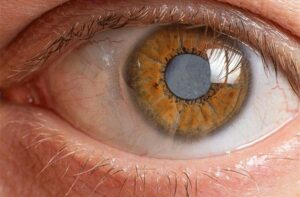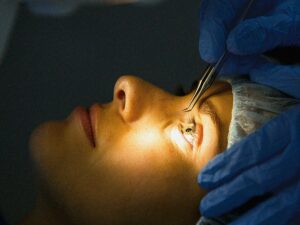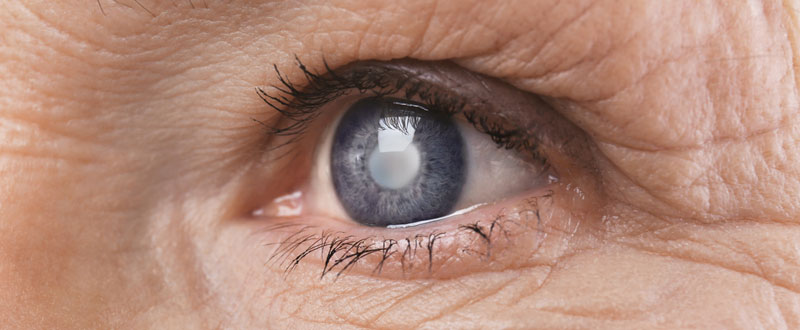Did you know that cataracts can be brown? In fact, a brown cataract is a common type of cataract. This blog post will discuss the causes and symptoms of brown cataracts, as well as treatment options.
Contents
What Are Brown Cataracts?
 Brown cataracts are also known as brunescent, which is a term derived from the Latin word brunescens, meaning “becoming brown.” This type of cataract is characterized by a gradual darkening and hardening of the lens that affects vision. Brown cataracts are more common in people over 60, but they can also occur due to trauma or disease.
Brown cataracts are also known as brunescent, which is a term derived from the Latin word brunescens, meaning “becoming brown.” This type of cataract is characterized by a gradual darkening and hardening of the lens that affects vision. Brown cataracts are more common in people over 60, but they can also occur due to trauma or disease.
It is a type of matured and visually impairing cataract, where the lens becomes hard and yellowish-brown. Vision can become blurry or distorted due to this type of cataract. It is important to note that no two cataracts are alike and each patient’s case is unique.
In fact, in the case of brown cataracts, there are many types, each with its own unique characteristics. The most common types of brown cataracts are known as anterior subcapsular cataracts, nuclear cataracts, and posterior polar cataracts.
Therefore, if you have been diagnosed with brown cataracts, it’s important to have an in-depth discussion with your eye care professional about the type of cataract, how it may be affecting your vision, and what treatment plan would be best for you.
What Are The Symptoms?
The symptoms might not be immediately noticeable, but they can include:
- Cloudiness in the vision
- Sensitivity to light
- Difficulty seeing at night
- Carey discoloration of the pupil
If you notice any of these symptoms, it is important to visit your ophthalmologist as soon as possible for a thorough eye exam. Moreover, the signs of these cataracts may be similar to other eye diseases, such as glaucoma and macular degeneration, so it is important to get an accurate diagnosis.
What Causes Brown Cataracts?
Brown cataracts are caused by the accumulation of pigment inside the lens of the eye. This type of cataract can be inherited or acquired later in life due to UV exposure, certain medications, or the natural aging process. It is important to note that brown cataracts can also occur in people with diabetes, which can cause discoloration of the lens.
In addition, the risk factors for developing a brown cataract may be increased by smoking, heavy alcohol consumption, and long-term use of steroids.
Thus, it is important to look for signs of brown cataracts in your eyes, as they can lead to vision loss if left untreated. With the right information and care, brown cataracts can be successfully treated.
How to Detect Brown Cataracts?
If you suspect that you might be developing a brown cataract, the first step is to visit an optometrist or ophthalmologist for an eye exam. During the exam, your doctor will look for signs of a brown cataract, including:
- A dark or discolored area in the center of the lens
- Cloudiness or dimming of vision
- Increasing difficulty seeing at night
- Halos around lights
Your optometrist or ophthalmologist may use a slit lamp or other testing equipment to accurately diagnose and measure the size of the cataract.
The diagnosis of brown cataracts is usually confirmed through a combination of your medical history, physical exam, and test results. Treatment options depend on the type and severity of the cataract.
How Can You Treat It?
There are several treatments available for brown cataracts. Some of the treatment options include:
Surgery
 The most common treatment is to remove the cataract surgically, which involves a small incision in the eye. After the procedure, your doctor may suggest you wear a protective patch and/or glasses for a few days as you heal. The procedure is usually successful and can improve your vision dramatically.
The most common treatment is to remove the cataract surgically, which involves a small incision in the eye. After the procedure, your doctor may suggest you wear a protective patch and/or glasses for a few days as you heal. The procedure is usually successful and can improve your vision dramatically.
However, you should remember that there are various types of surgery that may be necessary depending on the type of cataract present. So, you have to discuss the best option with your doctor.
Laser Therapy
In some cases, your doctor may suggest using a laser to break up the cloudy areas of the lens in order to improve vision. This is known as “laser-assisted cataract removal.” Laser therapy can often provide excellent results and can reduce the need for more invasive surgical procedures. However, it can be costly and is not always covered by insurance.
Eyedrops
In some cases, eye doctors may prescribe eyedrops to help dissolve the cataract. This method is usually only used when the cataract is very small or just beginning to form. It is not recommended for larger cataracts. Eye drops are usually expensive and may not be effective at treating the problem. But this can be a good option for some people.
Medication
Your doctor might also prescribe steroid drops or other medications to reduce inflammation and improve the clarity of your vision. The medicines are usually applied directly to the eye, and you should follow your doctor’s instructions carefully.
Lifestyle changes
Finally, your lifestyle always affects your vision. That’s why it’s important to make sure you’re getting enough sleep, eating a balanced diet, and not missing regular eye exams. In addition, if you smoke, it’s important to quit. Smoking increases your risk of developing all kinds of diseases, including cataracts.
Overall, these are some of the most common treatments for brown cataracts. It’s important to speak with your doctor about what care is best for you, as each person’s situation is different. With proper care and treatment, you can improve your vision and help prevent further damage to your eyes.
Conclusion
To conclude, brown cataracts are a common yet serious eye condition that requires immediate medical attention. They can develop at any age but are more commonly found in those who are over sixty years of age. Brown cataracts cause a significant amount of vision loss, and if left untreated, it can lead to irreversible blindness.
The right care and treatment are essential for maintaining vision and preventing further complications. So, do not hesitate to book an appointment with your ophthalmologist if you are experiencing any of the symptoms described in this article!
For more information and guidance, please contact Mantra Care. At MantraCare we have a team of experienced eye surgeons, who will be happy to answer any questions on cataract surgery. Call us at +91-9711116605 for any inquiries.
